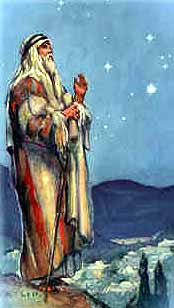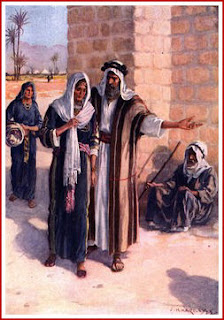Let's begin by rereading Genesis 15 (remember Bible Study Part 2?). Remember what God promised Abraham in that passage? He promised Abraham that his descendants would enter a land not their own and would eventually be oppressed and enslaved there, but they would come out by God's power and enter Canaan. Notice His promise:
13 Then the Lord said to him, "Know for certain that your descendants will be strangers in a country not their own, and they will be enslaved and mistreated four hundred years. 14 But I will punish the nation they serve as slaves, and afterward they will come out with great possessions. 15 You, however, will go to your fathers in peace and be buried at a good old age. 16 In the fourth generation your descendants will come back here, for the sin of the Amorites has not yet reached its full measure." 17 When the sun had set and darkness had fallen, a smoking firepot with a blazing torch appeared and passed between the pieces. 18 On that day the Lord made a covenant with Abram and said, "To your descendants I give this land, from the river of Egypt to the great river, the Euphrates — 19 the land of the Kenites, Kenizzites, Kadmonites, 20 Hittites, Perizzites, Rephaites, 21 Amorites, Canaanites, Girgashites and Jebusites." (NIV)
As we look again at this promise, what are the specifcs you see? Is the promise given a time frame? It seems God gives the promise a time frame of 400 years. What does God say in terms of the generations? Is it in the fourth generation after Abraham's death that this will occur?
How does God say Israel would be treated after entering this unnamed land? Would you say God describes harsh treatment? But how does God say these descendants of Abraham would leave that land? He says He will bring them out by punishing that land and these descendants would come out with great possessions. Finally, God identifies the territory of the inheritance. Before we leave this passage, its good to see the reason God will allow for this time frame and for the descendants of Abraham to take the land: because the sin of the Amorites will get worse and worse until it is "complete" or "full" (verse 16).
 As we looked at the highlights of the lives of Abraham, Isaac, and Jacob in our previous studies we saw some of the promises fulfilled. But not this one in Genesis15. We finished off last time by considering the promises to Jacob in Genesis 35:9-15. There God called Jacob, "Israel," and thus changed his name. In the space of chapters 25 - 35, Jacob is married and tricked by his father-in-law into marrying both of his daughters. In the struggle between these two sisters for the affection of Jacob, he fathers twelve sons. The last two are born by the woman he had originally loved and wanted to marry, Rachel. These twelve sons are listed in 35:16-26.
As we looked at the highlights of the lives of Abraham, Isaac, and Jacob in our previous studies we saw some of the promises fulfilled. But not this one in Genesis15. We finished off last time by considering the promises to Jacob in Genesis 35:9-15. There God called Jacob, "Israel," and thus changed his name. In the space of chapters 25 - 35, Jacob is married and tricked by his father-in-law into marrying both of his daughters. In the struggle between these two sisters for the affection of Jacob, he fathers twelve sons. The last two are born by the woman he had originally loved and wanted to marry, Rachel. These twelve sons are listed in 35:16-26.One of these twelve sons is Joseph whose life is the focus of Genesis 37-50. As a young man, Joseph was treated with partiality by his father, Jacob. On top of the special treatment, Joseph has the ability to dream and interpet visions which show his family bowing down to him. His brothers are jealous and at first seek to kill him, but instead choose to sell him to slave traders. The brothers deceive their father, Jacob (Israel), by telling him Joseph had been killed by animals.
The slave traders take Joseph at the age of 17 to Egypt where he becomes a household servant to the captain of Pharoah's bodyguard. Through a series of events which includes false charges, he is thrown into jail, meets two inprisoned members of Pharoahs household servants, and interprets their dreams. One of these is released and later tells Pharoah of Joseph's ability to interpret a pair of difficult dreams Pharoah has had. Joseph is brought before Pharoah and reveals that a famine will plague the region and suggests Egypt should prepare for the famine. Pharoah is so enamoured by Joseph's ability that he places him in charge of the project of preparing for the famine by collecting and selling grain over a 14 year period of surplus and famine.
Its during this time that Joseph's family comes to Egypt to buy grain during the regional famine (Genesis 42:1-2). Since its been roughly twenty years, his brothers do not recognize Joseph. Eventually, he reveals himself and the family of Israel (Jacob) moves to Egypt. Remember the promise of Genesis 15:13, Then the Lord said to him, "Know for certain that your descendants will be strangers in a country not their own..."
During the lifetime of this Pharoah, Israel enjoy prosperity in Egypt. Joseph serves as a high ranking administrator for Pharoah and things are good for Israel as a family. Joseph has his own sons and the entire family grows. In chapter 49, Jacob dies and Joseph's death is recounted in chapter 50. In Exodus chapter 1 a new Pharoah comes to power (Exodus 1:6-16):
Now Joseph and all his brothers and all that generation died, 7 but the Israelites were fruitful and multiplied greatly and became exceedingly numerous, so that the land was filled with them.
8 Then a new king, who did not know about Joseph, came to power in Egypt. 9 "Look," he said to his people, "the Israelites have become much too numerous for us. 10 Come, we must deal shrewdly with them or they will become even more numerous and, if war breaks out, will join our enemies, fight against us and leave the country." 11 So they put slave masters over them to oppress them with forced labor, and they built Pithom and Rameses as store cities for Pharaoh. 12 But the more they were oppressed, the more they multiplied and spread; so the Egyptians came to dread the Israelites 13 and worked them ruthlessly. 14 They made their lives bitter with hard labor in brick and mortar and with all kinds of work in the fields; in all their hard labor the Egyptians used them ruthlessly.
15 The king of Egypt said to the Hebrew midwives, whose names were Shiphrah and Puah, 16 "When you help the Hebrew women in childbirth and observe them on the delivery stool, if it is a boy, kill him; but if it is a girl, let her live." (NIV)
Did you notice what happens in this passage? A shift occurs in the national policy of Egypt. No longer do they look on the family of Israel as guests who are beneficial to them. Instead they see a nation which is a threat to this Pharoah's power. So how does Egypt begin to treat Israel? What does scripture say about how they are treated as (verse 11)? How does this compare to God's words to Abraham in Genesis 15:13, "...and they will be enslaved and mistreated four hundred years."
At this point, how closely has God's words to Abraham come true? Would you say they were accurate? What remains is for Israel to leave this oppressing nation. Notice what we read a little later in Exodus (2:23-25): During that long period, the king of Egypt died. The Israelites groaned in their slavery and cried out, and their cry for help because of their slavery went up to God. 24 God heard their groaning and he remembered his covenant with Abraham, with Isaac and with Jacob. 25 So God looked on the Israelites and was concerned about them.Had God forgotten about Israel? What is it that God remembered? In these few verses, we see again the link of God's promises or covenants with Abraham, Isaac, and Jacob. Consider again our funnel and the narrowing of families through whom the promise would be fufilled. Here it is articulated, so to speak.
In the chapters that follow we are introduced to God calling Moses (ch. 3) and Moses questioning his ability (ch. 4). Finally, in chapter 5, Moses is before Pharoah and he asks for the release of Israel, he appeals to Pharoah from the authority of the LORD (or YHWH often translated, Yahweh). Notice Pharoah's response (Exodus 5:2), Pharaoh said, "Who is the Lord, that I should obey him and let Israel go? I do not know the Lord and I will not let Israel go." (NIV)
Over the next several chapter Pharoah would learn who Yahweh is. 12 times Moses would seek the release of Israel, each time, Pharoah would refuse. 10 of those times, a plague would come upon Egypt. These were not just any plagues, however. Each one demonstrated God's power over a god of the Egyptian panoply. Each time, Moses would warn Pharoah, but he would refuse to listen so the plague would come. Following the last plague, with Egypt essentially destroyed, Pharoah allowed Israel to leave (Exodus 12:31-36):During the night Pharaoh summoned Moses and Aaron and said, "Up! Leave my people, you and the Israelites! Go, worship the Lord as you have requested. 32 Take your flocks and herds, as you have said, and go. And also bless me." 33 The Egyptians urged the people to hurry and leave the country. "For otherwise," they said, "we will all die!" 34 So the people took their dough before the yeast was added, and carried it on their shoulders in kneading troughs wrapped in clothing. 35 The Israelites did as Moses instructed and asked the Egyptians for articles of silver and gold and for clothing. 36 The Lord had made the Egyptians favorably disposed toward the people, and they gave them what they asked for; so they plundered the Egyptians. (NIV)
I few verses later we read: "Now the length of time the Israelite people lived in Egypt was 430 years. 41 At the end of the 430 years, to the very day, all the Lord's divisions left Egypt" (Exodus 12:40-41, NIV).
Think back to that passage in Genesis 15:13-15. ("Then the Lord said to him, "Know for certain that your descendants will be strangers in a country not their own, and they will be enslaved and mistreated four hundred years. 14 But I will punish the nation they serve as slaves, and afterward they will come out with great possessions"). Had God told Abraham that his descendants would be strangers in a land not their own? How had Israel entered Egypt? Was it not as stranger seeking relief from a famine? And how did God say that would be treated there, was it not with oppression and slavery? How was Israel treated once Joseph's Pharoah was no longer in power? How did God say the descendants of Abraham would leave that nation? Did he not say He would punish that nation and that Abraham's descendants would come out with great possessions? What happened with Israel?
Would you say, God kept His promise? Do you think any of the Israelites would imagine how things would transpire so that they would leave Egypt with great possessions? What promises has God made for you life? Is the promise to the serpent in Genesis 3, "[The woman's seed] will crush your head, but you will bruise his heel." Is there any way in which that promise might impact your life? What about God's promises to Abraham, Isaac, and Jacob, "through your seed all the nations of the earth will be blessed."? Is there a hint that your life will be blessed in the fulfillment of that promise?As we close out in this study, what we have seen is that God kept his promise to Abraham that his descendants would come of another nation. What we have not seen realized is Israel entering the land of Canaan. In our next study, we will see this next part of the promise also completed. There is still that last promise to Abraham: "Through your seed all the nations of the earth will be blessed." How will this happen, when will it happen, who will be the seed? How does this impact your life?
As always, you can find us at www.benbrookchurchofchrist.com or on





